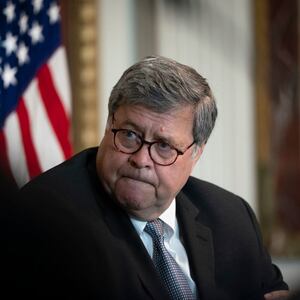Donald Trump’s attorney general has a novel perspective on the Department of Justice: That political influence in prosecution is a feature, not a bug.
William Barr reportedly asked prosecutors to explore criminal charges against Seattle Mayor Jenny Durkan for allowing a police-free zone during civil unrest in her city. If true, this conduct would be an astonishing abuse of power against a local Democratic official who has been at odds with Trump over strategies for handling COVID-19 and civil unrest. Barr has also reportedly suggested to prosecutors that they consider charging protesters with sedition, a crime that is rarely charged because of free speech concerns.
The attorney general’s embrace of politics—jarring to those of us who have worked for a department that prides itself on its independence from politics—was on display during an interview Monday, when he said that our country could become “irrevocably committed to the socialist path” if President Trump were not re-elected. And in the scathing and disingenuous speech he gave Wednesday to mark Constitution Day by denouncing states’ coronavirus restrictions as the "greatest intrusion on civil liberties" in American history "other than slavery" and pronouncing that “the Attorney General, senior DOJ officials, and U.S. Attorneys are indeed political. But they are political in a good and necessary sense.” Those are words no honest prosecutor will ever hang on their wall.
ADVERTISEMENT
Barr explained that politics serve as an important check on prosecutorial overreach. By being accountable to the electorate, the executive branch must exercise its discretion in a responsible way. True enough. If all he were doing as attorney general was assuring even-handed application of the laws, no one would take issue. But Barr conflates political accountability with partisan political favoritism. He noted that prosecutors may not base a prosecution on a defendant’s race or religion, but ignored the same Justice Manual provision that forbids decisions to be made on the basis of a person’s “political associations, activities and beliefs.”
The only public cases in which Barr has intervened have been the prosecutions of Michael Flynn, Trump’s former national security adviser, and Roger Stone, Trump’s former campaign adviser. Both Trump allies were convicted of crimes arising from the government’s investigation into Russian election interference. In the Flynn case, Barr directed the dismissal of the charges after Flynn had already pleaded guilty, using a legal theory of materiality that is contrary to the arguments DOJ makes in all other cases. In the Stone case, Barr insisted that prosecutors file an amended sentencing memorandum, reducing the sentencing recommendation from that provided for in the sentencing guidelines, contrary to DOJ policy and practice. Career prosecutors in both cases walked off the cases in protest.
And just last weekend, a career prosecutor resigned from the team of John Durham, the U.S. Attorney who is reportedly investigating the origins of the Russia election interference probe. Reports say that she left because of political pressure from Barr to produce results before the November election.
In defense of these resignations, Barr used one of his favorite tactics—creating a strawman argument, and then knocking it down.
In words that are likely to haunt him in DOJ infamy, Barr said Thursday, “Letting the most junior members set the agenda might be a good philosophy for a Montessori preschool, but it’s no way to run a federal agency.” There is nothing “junior” about the career prosecutors who are making case decisions in the Flynn, Stone, and Durham investigations. Prosecutors handling cases of this magnitude are seasoned veterans, who have worked across Republican and Democratic administrations, participated in countless training programs, and are subject to DOJ ethics rules and state bar discipline. Their supervisors are also career professionals.
But here is where Barr’s argument is a strawman–he inaccurately suggests that his critics say he should defer completely to career prosecutors. In fact, no one is making that argument. Career prosecutors understand the chain of command, and understand that while vigorous debate helps reach the best decision, differences of opinion will ultimately be decided by the person highest on the organizational chart. They bristle not at Barr’s overruling them per se, but at Barr’s overruling them based on the appearance of political favoritism. When Barr intervened to the benefit of allies of Trump, deviating from normal DOJ practice, this was not simply the evenhanded administration of justice. It was partisan political favoritism. And when the AG pressures a prosecutor to produce results before the election, in violation of DOJ policy that prohibits taking action to influence an election, he is abusing his power as our nation’s chief law enforcement officer. It is this gross misconduct that has prompted career prosecutors to resign.
While Barr’s arrogant and demeaning comments will be demoralizing to some career prosecutors, most have thick skins and will continue to go about their jobs with great professionalism. The real danger is that Barr is undermining the credibility of prosecutors to take on politically fraught crimes. By excoriating prosecutors against “the criminalization of politics,” he is giving Trump and his associates the green light to violate the law with impunity.
Barr’s message seems to be that politics in prosecution is good as long as it advances his side.







